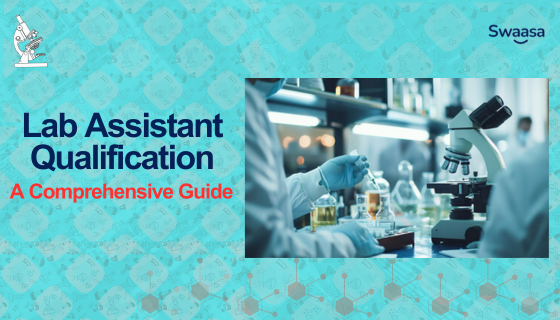
Lab Assistant Qualification: A Comprehensive Guide

22-Oct-2024
Lab Assistant Qualification: A Comprehensive Guide
Introduction
The role of a lab assistant is pivotal in various sectors, including healthcare, education, and research. Lab assistants perform essential tasks that support laboratory operations, making them an indispensable part of any scientific team. As the demand for skilled professionals in laboratories grows, understanding the qualifications required to enter this field becomes crucial. This guide will delve into the necessary educational backgrounds, specialized qualifications, career prospects, and exam requirements for aspiring lab assistants in India.
1. What is a Lab Assistant?
A lab assistant is a professional who supports laboratory technicians, scientists, and researchers in their daily tasks. They work in various environments, including hospitals, educational institutions, research facilities, and industrial labs. The primary responsibility of a lab assistant includes preparing samples, maintaining laboratory equipment, and assisting in experiments.
Key Responsibilities of a Lab Assistant
Sample Preparation: Collecting and preparing samples for testing or experimentation.
Equipment Maintenance: Regularly cleaning and maintaining laboratory instruments.
Data Documentation: Recording and documenting results from experiments and tests.
Assisting Researchers: Providing support to scientists and researchers during experiments.
Lab Safety: Ensuring that all safety protocols are followed to maintain a safe working environment.
2. Educational Qualifications for Lab Assistants
2.1 Basic Qualifications
To become a lab assistant in India, candidates typically need a specific educational background. Here are the common qualifications required:
Higher Secondary Education (12th Grade): The minimum requirement for most lab assistant positions is a higher secondary education with a focus on science subjects such as Physics, Chemistry, and Biology. This foundational knowledge is crucial for understanding laboratory processes and safety.
Diploma in Laboratory Technology: Pursuing a diploma in laboratory technology can enhance job prospects. This specialized training offers practical skills and knowledge necessary for working in laboratories.
2.2 Advanced Qualifications
For more advanced roles, additional qualifications may be beneficial:
Bachelor’s Degree: A bachelor's degree in medical laboratory technology, biological sciences, or a related field is often preferred. This degree provides a deeper understanding of laboratory practices and principles.
Postgraduate Qualifications: Candidates who wish to further their education can consider pursuing a master's degree in a specialized field such as biochemistry, microbiology, or clinical laboratory science. This can lead to better career opportunities and higher salary packages.
2.3 Specialized Qualifications for Different Roles
Different sectors may have varying requirements for lab assistants. Below are specific qualifications needed for various job roles:
2.3.1 School Lab Assistant Qualification
Minimum Qualification: Higher Secondary (12th grade) with Science subjects.
Special Training: A background in educational psychology or teaching can be an advantage.
2.3.2 Railway Lab Assistant Qualification
Minimum Qualification: 10+2 with Physics and Chemistry.
Entrance Exam: Candidates must clear the Railway Recruitment Board (RRB) exam for recruitment.
2.3.3 Polytechnic Lab Assistant Qualification
Minimum Qualification: Diploma in Engineering or Technology.
Relevant Skills: Understanding engineering principles and practices is essential.
2.3.4 PSC Lab Assistant Qualification
Minimum Qualification: Higher Secondary (10+2) in Science.
State-specific Requirements: Each state’s Public Service Commission (PSC) may have unique criteria for lab assistants.
2.3.5 Computer Lab Assistant Qualification
Minimum Qualification: 10+2 with Computer Science.
Skill Development: Familiarity with software applications, hardware maintenance, and troubleshooting is required.
Comparison of Educational Qualifications for Lab Assistants
Higher Secondary (10+2)
Description: Basic eligibility to apply for lab assistant roles
Typical Duration: 2 years
Diploma in Laboratory Technology
Description: Specialized training in laboratory practices
Typical Duration: 1-2 years
Bachelor's Degree
Description: Preferred for advanced positions in labs
Typical Duration: 3 years
Master’s Degree
Description: Enhanced career prospects in research or management
Typical Duration: 2 years
3. Lab Assistant Exam Qualifications
Certain positions require candidates to pass competitive exams. Here are some common examinations and their qualifications:
3.1 RSMSSB Lab Assistant Exam
Eligibility: Higher Secondary education in Science.
Exam Pattern: The exam consists of multiple-choice questions based on science subjects. It tests candidates' knowledge in relevant areas and their problem-solving abilities.
3.2 Kerala PSC Lab Assistant Exam
Eligibility: Candidates must have completed their higher secondary education.
Exam Structure: The exam includes a written test followed by an interview. Candidates should be familiar with the syllabus and pattern to prepare effectively.
3.3 Junior Lab Assistant Qualification
Minimum Qualification: 10+2 with relevant science subjects.
Exam Requirements: Specific state-level examinations for recruitment may be required, often focusing on practical knowledge and basic science concepts.
4. How to Apply for Lab Assistant Jobs
4.1 Steps to Secure a Lab Assistant Position
Research: Identify job openings through job portals and official websites.
Prepare Your Resume: Highlight relevant qualifications, practical skills, and any internships or training.
Apply Online: Submit applications through official channels, ensuring all required documents are included.
Prepare for Interviews: Be ready to discuss your educational background, practical experiences, and knowledge of lab procedures.
5. Lab Assistant Vacancy Trends in India
5.1 Current Job Market Overview
The demand for lab assistants is growing due to several factors, including the expansion of healthcare facilities, educational institutions, and research organizations. This section will highlight the current trends in lab assistant vacancies.
5.2 Lab Assistant Vacancy 2022
- Growth in Opportunities: There has been a significant increase in lab assistant vacancies across various sectors, driven by advancements in medical and scientific research.
- Government vs. Private Sector: Both sectors are actively hiring. Government roles often provide job security and benefits, while private sectors may offer higher salaries and opportunities for advancement.
Lab Assistant Vacancy Insights
2020
Sector: Healthcare
Number of Vacancies: 5,000
2021
Sector: Education
Number of Vacancies: 3,500
2022
Sector: Research
Number of Vacancies: 2,000
6. Salary Expectations for Lab Assistants
The salary of a lab assistant can vary widely depending on the employer, location, and level of experience. Below are average salary ranges for lab assistants in various sectors:
Average Salary Ranges
School Lab Assistant: ₹20,000 - ₹30,000 per month
Railway Lab Assistant: ₹25,000 - ₹35,000 per month
Polytechnic Lab Assistant: ₹22,000 - ₹32,000 per month
Junior Lab Assistant: ₹15,000 - ₹25,000 per month
Government Lab Assistant: ₹30,000 - ₹40,000 per month
7. Career Advancement Opportunities for Lab Assistants
7.1 Further Studies
Pursuing further studies can significantly enhance career prospects for lab assistants. Candidates can consider:
Bachelor’s Degree in Medical Laboratory Technology: This degree opens doors to more specialized roles and higher salary packages.
Master’s Degree in Life Sciences: A master's degree can lead to advanced positions in research or management.
Professional Certifications: Courses and certifications in specialized areas can improve job prospects.
7.2 Job Roles for Advancement
With experience and additional qualifications, lab assistants can advance to higher roles such as:
Senior Lab Technician: In charge of supervising junior lab assistants and overseeing lab operations.
Laboratory Manager: Responsible for managing laboratory budgets, staff, and protocols.
Research Scientist: Engaged in scientific research and experiments, requiring advanced degrees.
8. Frequently Asked Questions (FAQs) on Lab Assistant Qualifications
1Q: What qualifications do you need to be a lab assistant?
A: To become a lab assistant, you typically need at least a higher secondary education in science. A diploma or degree in a related field is often preferred.
2Q: Are there specific qualifications for school lab assistants?
A: Yes, school lab assistants usually need a higher secondary education with science subjects and may benefit from courses in educational psychology or teaching.
3Q: What is the qualification for a computer lab assistant?
A: A computer lab assistant generally needs a higher secondary education with a focus on computer science, along with relevant technical skills.
4Q: How can I prepare for lab assistant exams?
A: You can prepare by studying relevant subjects, practicing previous year papers, and staying updated on exam patterns and syllabi.
5Q: What are the growth prospects for lab assistants?
A: With experience and additional qualifications, lab assistants can move into higher roles such as laboratory managers or specialized technicians.
9. Additional Resources for Aspiring Lab Assistants
For further exploration of lab assistant qualifications and career paths, consider the following resources:
Professional Associations: Joining organizations like the Indian Association of Medical Microbiologists (IAMM) can provide networking opportunities and resources.
Online Courses: Websites like Coursera, edX, and Udemy offer courses in laboratory techniques and management.
Books: Reading textbooks on laboratory practices can enhance theoretical knowledge.
Conclusion
Becoming a lab assistant is a rewarding career path that offers numerous opportunities for growth and specialization. Understanding the necessary qualifications, preparing for exams, and exploring further studies can significantly enhance your chances of success in this field. As the demand for skilled lab professionals continues to rise, taking the right steps now will ensure a promising future in the laboratory sector.

AUTHOR

Related Jobs


